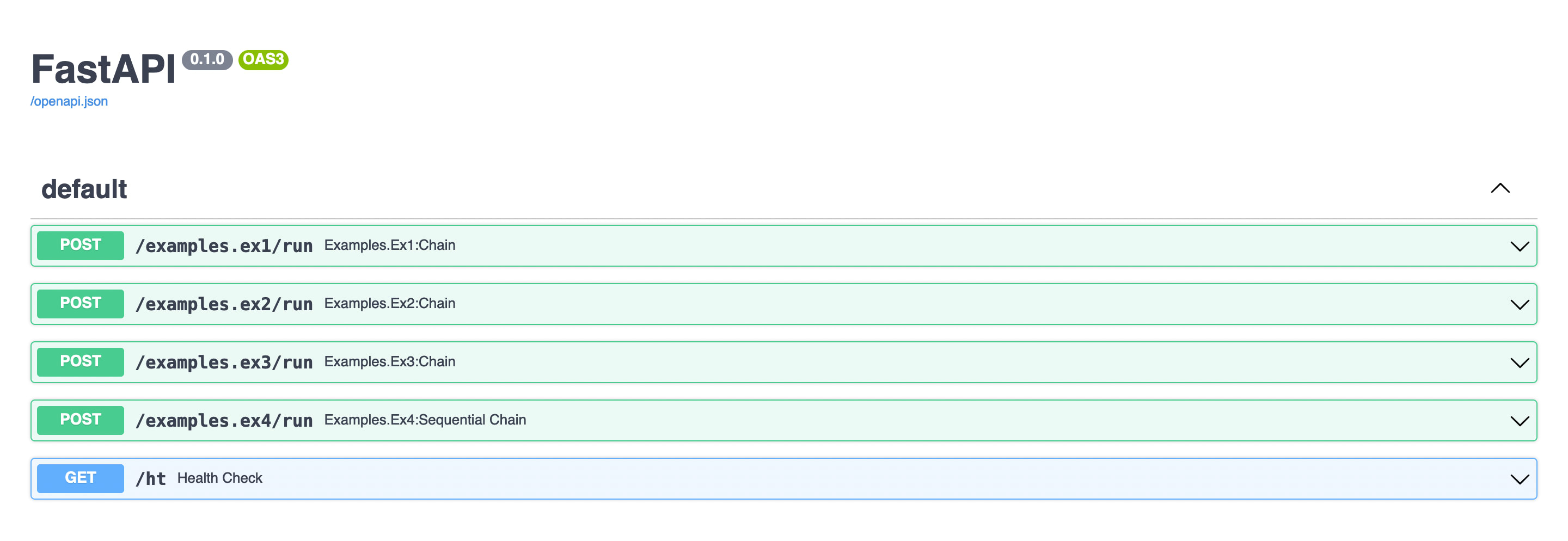LangCorn is an API server that enables you to serve LangChain models and pipelines with ease, leveraging the power of FastAPI for a robust and efficient experience.
- Easy deployment of LangChain models and pipelines
- Ready to use auth functionality
- High-performance FastAPI framework for serving requests
- Scalable and robust solution for language processing applications
- Supports custom pipelines and processing
- Well-documented RESTful API endpoints
- Asynchronous processing for faster response times
To get started with LangCorn, simply install the package using pip:
pip install langcornExample LLM chain ex1.py
import os
from langchain import LLMMathChain, OpenAI
os.environ["OPENAI_API_KEY"] = os.environ.get("OPENAI_API_KEY", "sk-********")
llm = OpenAI(temperature=0)
chain = LLMMathChain(llm=llm, verbose=True)Run your LangCorn FastAPI server:
langcorn server examples.ex1:chain
[INFO] 2023-04-18 14:34:56.32 | api:create_service:75 | Creating service
[INFO] 2023-04-18 14:34:57.51 | api:create_service:85 | lang_app='examples.ex1:chain':LLMChain(['product'])
[INFO] 2023-04-18 14:34:57.51 | api:create_service:104 | Serving
[INFO] 2023-04-18 14:34:57.51 | api:create_service:106 | Endpoint: /docs
[INFO] 2023-04-18 14:34:57.51 | api:create_service:106 | Endpoint: /examples.ex1/run
INFO: Started server process [27843]
INFO: Waiting for application startup.
INFO: Application startup complete.
INFO: Uvicorn running on http://127.0.0.1:8718 (Press CTRL+C to quit)or as an alternative
python -m langcorn server examples.ex1:chain
Run multiple chains
python -m langcorn server examples.ex1:chain examples.ex2:chain
[INFO] 2023-04-18 14:35:21.11 | api:create_service:75 | Creating service
[INFO] 2023-04-18 14:35:21.82 | api:create_service:85 | lang_app='examples.ex1:chain':LLMChain(['product'])
[INFO] 2023-04-18 14:35:21.82 | api:create_service:85 | lang_app='examples.ex2:chain':SimpleSequentialChain(['input'])
[INFO] 2023-04-18 14:35:21.82 | api:create_service:104 | Serving
[INFO] 2023-04-18 14:35:21.82 | api:create_service:106 | Endpoint: /docs
[INFO] 2023-04-18 14:35:21.82 | api:create_service:106 | Endpoint: /examples.ex1/run
[INFO] 2023-04-18 14:35:21.82 | api:create_service:106 | Endpoint: /examples.ex2/run
INFO: Started server process [27863]
INFO: Waiting for application startup.
INFO: Application startup complete.
INFO: Uvicorn running on http://127.0.0.1:8718 (Press CTRL+C to quit)Import the necessary packages and create your FastAPI app:
from fastapi import FastAPI
from langcorn import create_service
app:FastAPI = create_service("examples.ex1:chain")Multiple chains
from fastapi import FastAPI
from langcorn import create_service
app:FastAPI = create_service("examples.ex2:chain", "examples.ex1:chain")or
from fastapi import FastAPI
from langcorn import create_service
app: FastAPI = create_service(
"examples.ex1:chain",
"examples.ex2:chain",
"examples.ex3:chain",
"examples.ex4:sequential_chain",
"examples.ex5:conversation",
"examples.ex6:conversation_with_summary",
"examples.ex7_agent:agent",
)Run your LangCorn FastAPI server:
uvicorn main:app --host 0.0.0.0 --port 8000Now, your LangChain models and pipelines are accessible via the LangCorn API server.
Automatically served FastAPI doc Live example hosted on vercel.
It possible to add a static api token auth by specifying auth_token
python langcorn server examples.ex1:chain examples.ex2:chain --auth_token=api-secret-valueor
app:FastAPI = create_service("examples.ex1:chain", auth_token="api-secret-value")POST http://0.0.0.0:3000/examples.ex6/run
X-LLM-API-KEY: sk-******
Content-Type: application/json{
"history": "string",
"input": "What is brain?",
"memory": [
{
"type": "human",
"data": {
"content": "What is memory?",
"additional_kwargs": {}
}
},
{
"type": "ai",
"data": {
"content": " Memory is the ability of the brain to store, retain, and recall information. It is the capacity to remember past experiences, facts, and events. It is also the ability to learn and remember new information.",
"additional_kwargs": {}
}
}
]
}
Response:
{
"output": " The brain is an organ in the human body that is responsible for controlling thought, memory, emotion, and behavior. It is composed of billions of neurons that communicate with each other through electrical and chemical signals. It is the most complex organ in the body and is responsible for all of our conscious and unconscious actions.",
"error": "",
"memory": [
{
"type": "human",
"data": {
"content": "What is memory?",
"additional_kwargs": {}
}
},
{
"type": "ai",
"data": {
"content": " Memory is the ability of the brain to store, retain, and recall information. It is the capacity to remember past experiences, facts, and events. It is also the ability to learn and remember new information.",
"additional_kwargs": {}
}
},
{
"type": "human",
"data": {
"content": "What is brain?",
"additional_kwargs": {}
}
},
{
"type": "ai",
"data": {
"content": " The brain is an organ in the human body that is responsible for controlling thought, memory, emotion, and behavior. It is composed of billions of neurons that communicate with each other through electrical and chemical signals. It is the most complex organ in the body and is responsible for all of our conscious and unconscious actions.",
"additional_kwargs": {}
}
}
]
}To override the default LLM params per request
POST http://0.0.0.0:3000/examples.ex1/run
X-LLM-API-KEY: sk-******
X-LLM-TEMPERATURE: 0.7
X-MAX-TOKENS: 256
X-MODEL-NAME: gpt5
Content-Type: application/jsonSee ex12.py
chain = LLMChain(llm=llm, prompt=prompt, verbose=True)
# Run the chain only specifying the input variable.
def run(query: str) -> Joke:
output = chain.run(query)
return parser.parse(output)
app: FastAPI = create_service("examples.ex12:run")For more detailed information on how to use LangCorn, including advanced features and customization options, please refer to the official documentation.
Contributions to LangCorn are welcome! If you'd like to contribute, please follow these steps:
- Fork the repository on GitHub
- Create a new branch for your changes
- Commit your changes to the new branch
- Push your changes to the forked repository
- Open a pull request to the main LangCorn repository
Before contributing, please read the contributing guidelines.
LangCorn is released under the MIT License.







